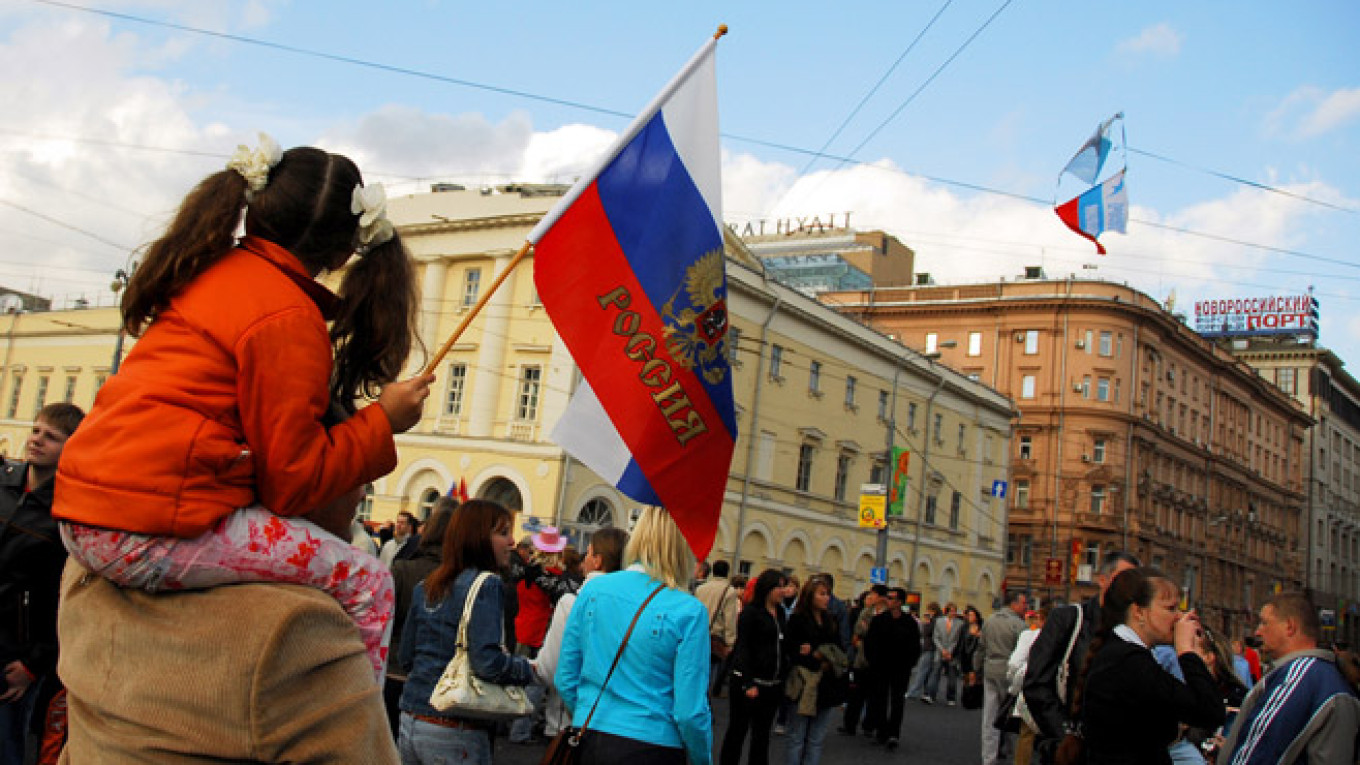A top Russian official on Wednesday welcomed the demise of the U.S. hegemony and the emergence of a new post-Cold War world order, two end-goals that experts agree have guided many of President Vladimir Putin's recent foreign policy moves.? ? ?
"The hegemony of the U.S. on the world stage has come to an end," said Yevgeny Lukyanov, deputy head of the Russian Security Council, in a strongly worded interview with RIA Novosti, a state-owned news outlet that has been recently revamped into a pro-Kremlin global news agency.
"We need to sit down and agree [on a new post-Cold War world order]. There must be a global congress that includes all key players," he said.
Lukyanov rehashed Putin's notion of Russia's re-emergence as a key player on the world stage after years of post-Soviet poverty, political turmoil and weakened international influence, and the demise of the U.S.-dominated international system. Despite his aspirations to mold a new world order, Putin has never bluntly called on Western leaders to revise the international system by taking new emerging powers into account.
Through its annexation of Crimea and its ongoing involvement in the Ukraine crisis,? Russia has demonstrated a willingness to preserve its influence in the country. The conflict in Ukraine has been described by some political pundits as the Kremlin's tacit invitation to the West to renegotiate the rules in a geopolitical game where Moscow's interests would feature centrally.
In addition to criticizing what Russia sees as NATO's attempts to expand eastwards and Western double standards in foreign policy, Lukyanov drew inspiration from Putin, who told Russian ambassadors on Tuesday that foreign relations should be built on the basis of "equality, mutual respect and concern for mutual interests."
"It is clear that we are not liked in some countries, that we are envied," Lukyanov said. "But we do not demand love. We insist on the need to comply with international law, the sovereign rights of states and noninterference in their internal affairs."
The Kremlin's desire to forge a multipolar international order where the views of Moscow, Brasilia, New Delhi, Beijing and Pretoria would carry as much weight as Washington's is tied to its willingness to de-escalate global tensions for the sake of its own development, according to pro-Kremlin political analyst Sergei Markov.
"Russia has been through a lot of wars, and is currently fighting one with the U.S. over Ukraine," said Markov, who serves as vice-rector of the prestigious Plekhanov Russian University of Economics in Moscow. "The country suffered from World War II and the Cold War. Now Russia just wants to relax, to grow. It does not need to be bogged down in an intractable conflict with the West."
Igor Bunin, the director of Moscow-based think tank Center for Political Technologies, said that Lukyanov's remarks were actually aimed at justifying the fait accompli of Russia's annexation of Crimea, which was strongly condemned by the Western governments.
"When Lukyanov says there is the opportunity to renegotiate the rules of the game with the U.S., what he really means is 'Crimea is ours,'" he said.
Russia's annexation of Crimea in March was broadly hailed as a victory within Russian society, as an example of the country's resistance to Western pressure and its ability to play by its own rules on the international stage. Putin's approval rating skyrocketed to a six-year high following Russia's absorption of Crimea and Sevastopol.
The use of Lukyanov — who widely remains unknown to the public despite his close connection with the Kremlin — to get Moscow's message across through state-owned media came as no surprise to political analysts. Lukyanov's low profile within the state apparatus has allowed the Kremlin to discretely test the reaction of targeted foreign decision-makers to its thoughts on a new world order.
"If a more public or prominent figure would have said these things, it would have simply come off as ludicrous," Bunin said.?
See also:
Putin Lashes Out Against Cold War-Style Containment of Russia
Contact the author at g.tetraultfarber@imedia.ru
A Message from The Moscow Times:
Dear readers,
We are facing unprecedented challenges. Russia's Prosecutor General's Office has designated The Moscow Times as an "undesirable" organization, criminalizing our work and putting our staff at risk of prosecution. This follows our earlier unjust labeling as a "foreign agent."
These actions are direct attempts to silence independent journalism in Russia. The authorities claim our work "discredits the decisions of the Russian leadership." We see things differently: we strive to provide accurate, unbiased reporting on Russia.
We, the journalists of The Moscow Times, refuse to be silenced. But to continue our work, we need your help.
Your support, no matter how small, makes a world of difference. If you can, please support us monthly starting from just $2. It's quick to set up, and every contribution makes a significant impact.
By supporting The Moscow Times, you're defending open, independent journalism in the face of repression. Thank you for standing with us.
Remind me later.


